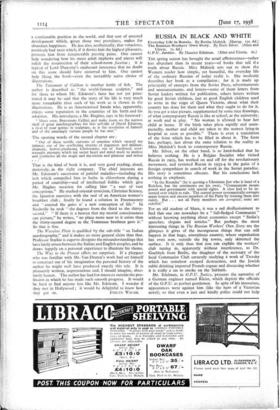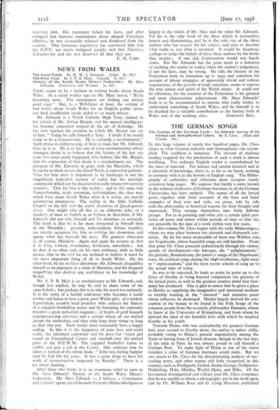RUSSIA IN BLACK AND WHITE
G.P.U. Justice. By Maurice Edelman. (Allen and Unwin. 6s.)
THE spring season has brought the usual efflorescence—rather less abundant than in recent years—of books that tell the
truth about Russia. Miss Malnick sets out to show the Western reader how simple, yet beautiful, the everyday life of the ordinary Russian of today really is. She modestly describes her book as a compilation ; for it is made up principally of excerpts from the Soviet Press, advertisements and announcements, and letters—some of them letters from Soviet leaders written for publication, others letters written by good Soviet children, just as good English children used to write in the reign of Queen Victoria, about what their country has done for them and what they ought to do for it. So you get a nice picture, supplemented by some nice drawings, of what contemporary Russia is like at school, at the university, at work and at play. " No woman is allowed to bear her child at home. If the birth takes place rapidly and unex- pectedly, mother and child are taken to the nearest lying-in hospital as soon as possible." There is even a translation of the form which has to be filled in about it. The form has, perhaps, just about the same relation to the reality as Miss Malnick's book "to contemporary Russia.
Mr. Silver, on the other hand, is so hard-boiled that he believes nothing. He is a Belgian Socialist who visited Russia in x905, has worked on and off for the revolutionary movement, and revisited Russia in 1933-4 in the guise of a foreign sympathiser in search of work in the Soviet paradise. His story is sometimes obscure. But his conclusions lack nothing in emphasis.
" In the Kremlin" (he is quoting a Ukrainian Jew who is head of a Kolchoz, but the sentiments are his own), "Communism means power and government with special rights. A class had to be in- vented over which to rule. The central power systematically corrupts many honest and sincere members of the Party by training them into rulers. But . . . not all Party members are corrupted; some are expelled."
For an old student of Marx, it was a sad disillusionment to
find that one can nowadays be a " full-fledged Communist " without knowing anything about economics except " Stalin's speeches, slogans and articles." But perhaps the most interesting things in The Russian Workers' Own .Story are the glimpses it gives of the incongruous things that can still happen in that huge, amorphous .country, where organisation has even now, outside the big towns,, only skimmed the surface. It is only thus that you can explain the workers'
club tuning in, "apparently ,without interference, to Dr. Goebbels from Berlin, the daughter of the secretary of the local Communist Club earnestly' studying a work of Trotsky which has somehow escaped destruction, and the Jewish rabbi drinkini imported French cognac and discussing whether it is really a sin to smoke on the Sabbath.
Mr. Edelman, in G.P.U.Justice, presents the narrative of a German engineer named Kleist, which depicti the officials of the G.P.U. as perfect gentlemen. In spite of his innocence, appearances were against him. (like the hero of a' Victorian novel), so that even a just and kindly police ,could not help
arresting him. His 'treatment belied his fears, and after stringent but humane examination about alleged Trotskyist affinities, he was eventually released and dismissed from the country. This fortunate experience has convinced him that the G.P.U. are much maligned people, and that , Zinoviev, Tukachevsky and the rest deserved all that they got.
E. H. CARR.



















































 Previous page
Previous page